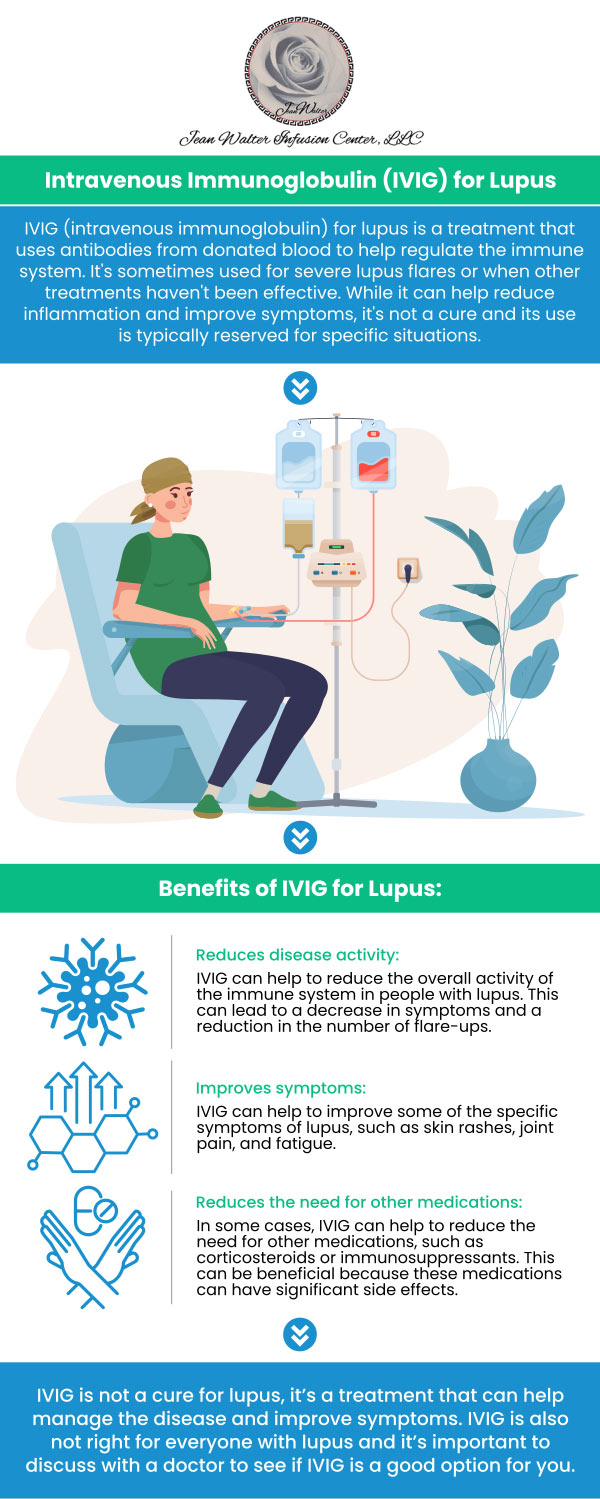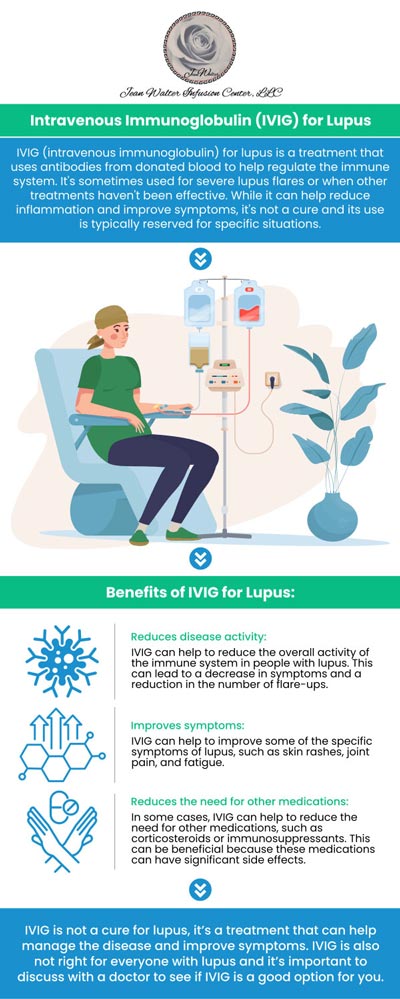IVIG Therapy for Lupus Treatment in Glen Burnie MD
At Jean Walter Infusion, Dr. Nasser Nasseri, MD, and his team offer intravenous immunoglobulin (IVIG) therapy as a cutting-edge treatment for patients battling Lupus in Maryland. This innovative therapy, administered under the careful supervision of our experienced medical team, aims to modify the immune system’s activity, offering relief from Lupus symptoms. We are conveniently located at 203 Hospital Dr, Suite 300A, Glen Burnie, MD 21061. For more information, contact us or book an appointment online.




Table of Contents:
Is IVIG used to treat lupus?
What does IVIG do for autoimmune disease?
How long does it take for IVIG to work for autoimmune disease?
How do you stop lupus from progressing?
By introducing healthy antibodies into the body, IVIG Therapy can help reduce inflammation and control the auto-immune response characteristic of Lupus. At Jean Walter Infusion, our priority is to provide a comfortable and supportive environment, ensuring that each patient receives personalized care tailored to their unique health needs.
IVIG, or intravenous immunoglobulin, therapy is increasingly recognized as a potential treatment option for lupus, an autoimmune disease that causes the immune system to attack its tissues. The therapy involves administering purified antibodies from donated blood plasma directly into the bloodstream, aiming to offer temporary immune modulation. For Lupus patients, IVIG might provide significant benefits by dampening the overactive immune response, reducing inflammation, and alleviating some of the severe symptoms associated with the condition, such as joint pain, skin rashes, and fatigue. While not a cure for Lupus, IVIG is considered for individuals who have not responded adequately to conventional treatments, offering a supplementary approach to manage and control the disease’s progression. Clinical trials and patient experiences suggest that IVIG can improve the quality of life for some Lupus sufferers, highlighting the therapy’s potential as a valuable part of a multi-faceted treatment strategy.
In the context of autoimmune diseases, intravenous immunoglobulin (IVIG) offers a promising treatment pathway by providing a concentrated dose of immunoglobulins (antibodies) drawn from healthy donors into the patient’s bloodstream. The core mechanism through which IVIG functions involves the modulation of the immune system’s errant response. Specifically, it helps to dampen the hyperactive immune system’s attack on the body’s tissue, thereby reducing symptoms and preventing further damage. IVIG achieves this through several mechanisms, including the neutralization of autoantibodies (harmful antibodies produced against the body’s proteins), modulation of the complement system (a part of the immune system that enhances the ability of antibodies and phagocytic cells to clear microbes and damaged cells), and regulation of inflammatory mediators. Additionally, IVIG plays a role in modulating the function and distribution of lymphocytes (white blood cells vital to the immune response). Given these effects, IVIG therapy has emerged as a crucial intervention for managing various autoimmune conditions, offering significant improvements in symptoms and quality of life where other treatments may have failed.
The onset of effectiveness of IVIG therapy for autoimmune diseases varies among individuals, depending on the specific condition being treated, the severity of symptoms, and the patient’s overall health profile. Generally, improvement may be observed within a few days to several weeks after the initiation of treatment. However, in some cases, it may take up to several months for the full benefits of IVIG to be realized. It’s important to note that IVIG provides temporary relief; thus, treatments are often administered regularly, ranging from every few weeks to every few months, to maintain symptom control. The timeline for response also depends on how quickly a patient’s body metabolizes the infused antibodies and the rate at which their immune system responds to the treatment. Continuous monitoring by healthcare providers is essential to evaluate the effectiveness of IVIG therapy and to adjust dosing schedules as necessary to optimize treatment outcomes.
Halting the progression of lupus, an autoimmune disease with a spectrum of symptoms, requires a multifaceted approach to treatment and lifestyle adjustments. Early diagnosis and comprehensive management, under the guidance of healthcare professionals, are crucial. Treatment plans often include medications such as anti-inflammatory drugs, immunosuppressants, and occasionally antimalarial drugs, all aimed at reducing immune system overactivity and managing symptoms. In addition to pharmaceutical interventions, individuals are advised to adopt lifestyle changes that may mitigate symptom flare-ups; these include maintaining a balanced diet rich in fruits, vegetables, and lean proteins, regular exercise tailored to individual capabilities, and strategies for stress management. Protection from sun exposure, by wearing protective clothing and using sunscreen, is essential due to the photosensitivity associated with lupus. Lastly, regular communication with healthcare providers, aimed at monitoring the disease and adjusting treatments as necessary, is key to managing lupus effectively and preventing disease progression.
At Jean Walter Infusion, we understand the complexities and challenges that come with managing autoimmune diseases like Lupus. Our dedicated team is committed to delivering the highest quality of care and supporting you through every step of your treatment. Together, we can explore how our treatments, including IVIG therapy, could potentially improve your quality of life and offer the relief you have been searching for. Your health and comfort are our utmost priorities, and we are here to provide the care and support you deserve. We are conveniently located at 203 Hospital Dr, Suite 300A, Glen Burnie, MD 21061. For more information, contact us or book an appointment online. We serve patients from Glen Burnie MD, Pasadena MD, Edgewater MD, Jacobsville MD, Ferndale MD, Severn MD, and surrounding areas.
Check Out Our 5 Star Reviews

Additional Services We Offer


- Infusion Therapy
- Injection Treatments
- Intravenous Immunoglobulin Therapy
- Medical Conditions
- Asthma
- Crohn’s Disease
- Fibromyalgia
- Gout
- Inflammatory Eye Disease
- Inflammatory Skin Disease
- Iron Deficiency
- Lupus
- Multiple Sclerosis
- Myositis
- Osteoporosis
- Rheumatoid Arthritis
- Ulcerative Colitis
- Vasculitis
- PRP Injections






